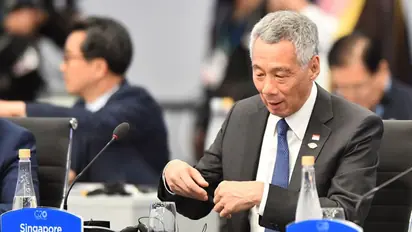'There was Nehru's India...': Singapore PM's lesson on how democracy must operate

Synopsis
"While Nehru's India has become one in which, according to media sources, over half of the Lok Sabha MPs face criminal accusations, including rape and murder. Though many of these claims are claimed to be politically motivated," Lee stated.
During an argument in Parliament, Singapore Prime Minister Lee Hsien Loong cited India's first prime minister, Jawaharlal Nehru, to argue how democracy should operate in the city-state. "Most countries are created and begin with lofty aspirations and great principles. But, more often than not, things evolve gradually over decades and generations, beyond the founding leaders and the pioneer generation," Lee remarked during a discussion on the Committee of Privileges' report on accusations about untruths uttered by former Workers' Party legislator Raeesah Khan.
"Things begin with a passionate intensity. Leaders who battled for and gained independence are frequently remarkable persons with great bravery, enormous culture, and amazing talent. They emerged from the crucible of fire as men and nations' leaders. They are the David Ben-Gurions and Jawaharlal Nehrus, and we have our own," he explained.
Imbued with great personal prestige, they seek to match their peoples' lofty aspirations by constructing a bold new world and shaping a new future for their peoples and countries. However, as the initial fervour wears off, successive generations frequently struggle to maintain the momentum and motivation, according to Lee. Politics is changing, and people's trust in politicians is dwindling. After a long time, the electorate believes that this is the norm and that better cannot be expected. As a result, standards are lowered, confidence is destroyed, and the country suffers more, according to the prime minister.
"While Nehru's India has become one in which, according to media sources, over half of the Lok Sabha MPs face criminal accusations, including rape and murder. Though many of these claims are claimed to be politically motivated," Lee stated.
According to the 70-year-old prime minister, each following generation must maintain and expand on the system that Singapore has inherited. "This necessitates upholding honesty, enforcing norms and standards, applying the same rules equally to everyone, and ensuring that no one is above the law. If we can do it "consistently, relentlessly, and unflinchingly," we might be able to make things work. People can have faith in our leaders, systems, and organisations," he said.
"As both the governed and the governing embrace and embody the correct norms and principles, our democracy may evolve, deepen, and become more durable. Singapore has the potential to thrive in the future. But if we allow ourselves to slacken, to weaken standards here and there, to ignore a falsehood here and there, the virtuous cycle will stutter and begin to falter," he stated.
The Committee of Privileges, directed by Speaker of Parliament Tan Chuan-Jin, was investigating Workers' Party legislator Khan's conduct after she admitted lying in Parliament on November 1. This was in response to allegations that she escorted a sexual assault victim to a police station where the victim was handled insensitively. Khan should be fined SGD 25,000, according to the committee, for lying before Parliament on August 3. On October 4, she repeated the lie, for which the committee is requesting an extra punishment of SGD 10,000.
In November, Khan confessed in Parliament that she had in fact heard this anecdote in a support group she was part of, and had shared it without the victim's consent. Khan, 29, resigned as a WP member and MP on November 30, a mere 15 months after being sworn in as Singapore's youngest MP after the 2020 general election.
Also Read | Modi invokes Nehru again, reminds Goa from Rajya Sabha of Congress betrayal
Also Read | PM Modi's Nehru-pe-charcha dents Congress inflation attack
Check the Breaking News Today and Latest News from across India and around the world. Stay updated with the latest World News and global developments from politics to economy and current affairs. Get in-depth coverage of China News, Europe News, Pakistan News, and South Asia News, along with top headlines from the UK and US. Follow expert analysis, international trends, and breaking updates from around the globe. Download the Asianet News Official App from the Android Play Store and iPhone App Store for accurate and timely news updates anytime, anywhere.